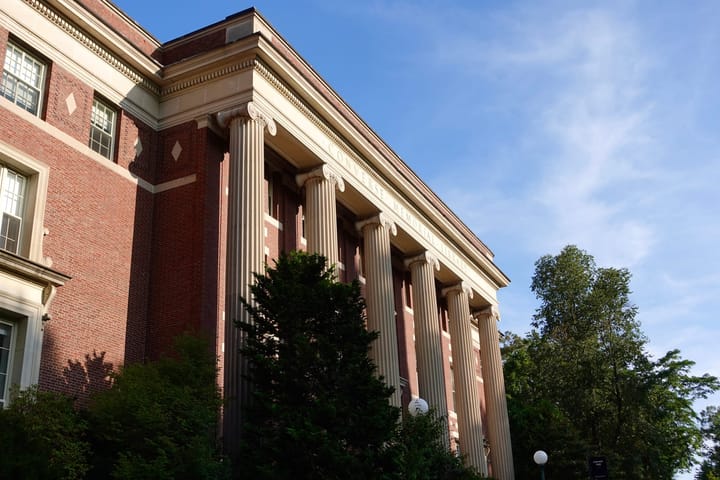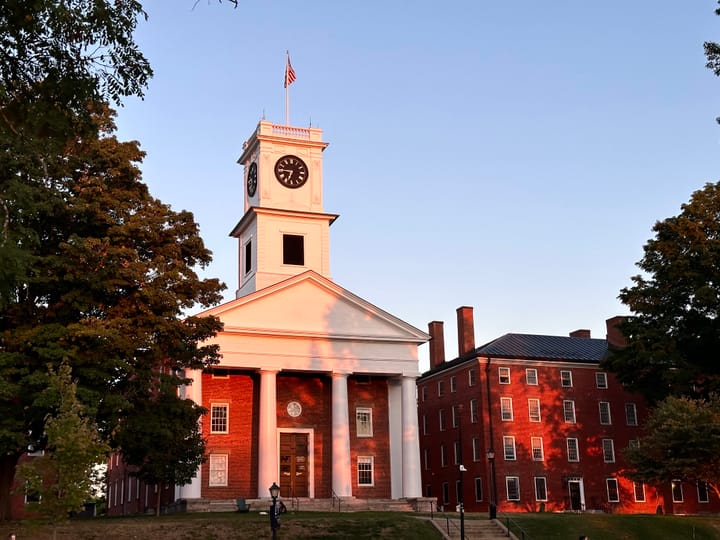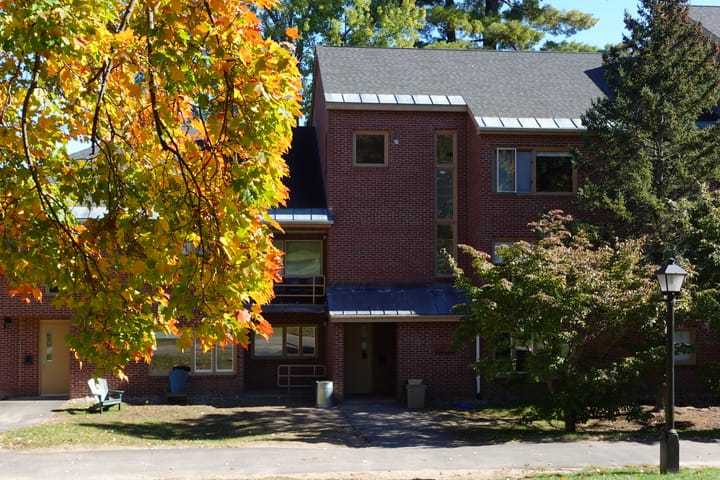The Importance of Local Politics
Assistant Opinion Editor Caroline Flinn ’28 writes about the importance of treating Amherst as more than a temporary place of residence by engaging in local politics.
At Amherst College, it’s easy to get swept up in the big picture. We follow national headlines, rally for global causes, and attend panels about the future of democracy and justice on a global scale. We clearly care deeply about the broader world, but when it comes to the college town we actually live in, we all draw a blank. Who represents Amherst on the Town Council and School Committee? What decisions are being made about Amherst schools, Amherst roads, and Amherst housing? Too often, we move through our time here inside a campus bubble — we live in Amherst for eight or nine months out of the year, but we don’t treat it as a community we inhabit and help shape. For many students, it’s as if Amherst is a temporary stop on the way to somewhere else. Our strongest sense of identity is often tied to our hometowns or to the college itself, while the town around us fades into the background. But ignoring Amherst as a living community misses an important truth: We are here, shaping and being shaped by this place, for years of our lives.
Local politics may not pop up on the news notifications on our phones, but every decision by the Town Council ripples through the lives of Amherst students: The potholes we bike and drive over, skyrocketing off-campus rent, stalled climate initiatives, and the structure of public safety all directly affect us. Even the local public schools matter beyond just their classrooms: funding and quality influence families moving in and out, the local economy, town resources, and therefore, infrastructure that might affect us all. At this level, individual voices truly matter, and getting involved builds lasting civic habits: speaking up, organizing, and holding leaders accountable. Local politics makes democracy real, immediate, and tangible.
My own experience with local politics — seeing how local environmental decisions shaped my hometown, how campaign work built connections between neighbors, how calling representatives led to concrete responses, and how protests shifted local conversations — has shown me that we need to engage with our town communities because decisions made locally affect our daily lives in ways we often overlook. Working on local issues in my hometown has made democracy feel tangible for me, showing both the power and limits of student involvement in shaping the community where we live. Even small efforts matter, and participating in local decisions gives students and young people a chance to influence the place where we live and learn.
Getting involved locally isn’t just about helping “someone else’s town.” It’s about recognizing that Amherst is the setting of our lives right now, and our voices can influence what kind of place it becomes. Of course, some might question why college students should engage if we’re only here for four years — whether it’s ethical to push for changes we may not be around to experience, especially if our priorities clash with those of long-term residents. At the same time, learning to take part in local democracy here prepares us to engage wherever we end up living next. Paying attention, speaking up, and showing up to town events is a way to practice the kind of citizenship we’ll carry beyond college. It is equally important to develop the habit of civic engagement, as widespread political apathy poses a serious risk to the health of democracy in any community. So, it’s time that we, as Amherst College students, start paying closer attention to local Amherst politics, while also acknowledging and wrestling with the tensions that come with our role as temporary residents.
For the past six years, Amherst’s local leadership has fallen short. Public schools have faced painful budget cuts that have eroded the quality of education and left teachers and families fighting for basic resources. Housing has become increasingly unaffordable, with students and working families alike struggling to cope with skyrocketing rents and limited availability. The town’s progressive reputation on climate action has not always translated into concrete, ambitious policies. These outcomes are not inevitable; they reflect local decisions made by elected officials, often without sufficient input or engagement from the broader community.
The 2025 Town Council and School Committee races are therefore critical for reshaping Amherst’s trajectory. The Town Council will decide whether to finally advance affordable housing initiatives that make it possible for students and families to stay in Amherst, or whether to continue policies that drive people out. It will determine whether sustainability is prioritized through real investments in public transit, renewable energy, and composting, or whether Amherst’s climate leadership remains more symbolic than substantive. The School Committee will chart the future of Amherst’s public schools, choosing whether to listen to educators, invest in equity, and rebuild trust with marginalized students and families, or to keep the district on its current path of underfunding and disillusionment. And both bodies will have a say in how public safety is reimagined: whether Amherst expands alternatives to policing and builds community-based safety models or defaults to the same structures that have long excluded and harmed vulnerable groups.
The 2025 Amherst elections offer a clear choice for students who care about progressive, grassroots change, and the candidates running on this slate exemplify what local activism can look like in practice. Since most Amherst students cannot vote in these elections, the real opportunity lies in volunteering for these campaigns — knocking on doors, phone banking, and amplifying candidates’ messages — rather than simply casting a ballot.
The town elections this year present a clear choice for students invested in progressive, grassroots change. For Town Council, Jill Brevik (D-1) campaigns on participatory democracy, affordable housing, and policing alternatives. Allegra Clark (at-large) focuses on climate justice and abolition, drawing on her radical activism at the University of Massachusetts, Amherst to connect with students committed to social and environmental justice. Incumbent Ellisha Walker (at-large) advances racial equity, universal composting, and inclusive policymaking shaped by her experience as a low-income single parent. Amber Cano Martin (D-2) champions participatory budgeting, labor rights, and language justice, while Heather “Hala” Lord (D-3) emphasizes anti-racism, wellness, and climate justice through her nonprofit leadership. The progressive slate of the School Committee, Bridget Hynes centers equity and creative funding solutions; Laura Jane Hunter prioritizes transparency, educator pay, and marginalized students; Deb Leonard pushes for stronger budgets and scrutiny of charter schools; and newcomer Esther Azur advocates for inclusive representation and robust school funding.
On Saturday, from 3 to 4 p.m. on the north side of Amherst Common, Marisol Pierce Bonifaz, a community organizer and recent Amherst High School graduate; Julian Hynes, also a community organizer; and Amherst College Democrats are hosting a Youth Listening Session. Progressive candidates for both the Town Council and School Committee will be in attendance, creating a space where students can share their priorities on issues like climate action, school funding, and accessibility in local government. This is a chance for students to move beyond the campus bubble and make their voices heard, ensuring that the people running Amherst understand the needs and values of the younger generation.
Students have many ways to move from awareness to action in Amherst and beyond. Start by attending local events like the Youth Listening Session on Saturday. Go further by engaging with campaigns — volunteer, canvass, or simply have conversations about the issues that matter most. Join the town’s Civic Academy next year, or participate in town committees and advisory boards, or schedule meetings with council members to share your perspective. Get involved with political or issue-based groups on campus — whether partisan or nonpartisan — such as Amherst College Democrats, Amherst Political Union, Environmental Justice Alliance, or others that fall in between.
If students and young people remain disengaged with local politics, decisions about housing, schools, climate policy, and public safety will be shaped by those already in power, rather than the diverse and vibrant community that actually lives here. By stepping up, students and young people can ensure the town reflects the values of justice, equity, and community participation.
Amherst is more than a backdrop to our college experience — it is a living community that we are actively part of. The town we live in, the streets we walk, the schools we pass, and the policies that govern them are all shaped by local politics. Don’t just live in Amherst — be part of Amherst. Local politics is where change starts — and Amherst is waiting for us to show up.





Comments ()